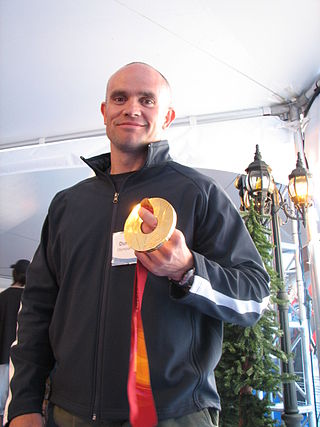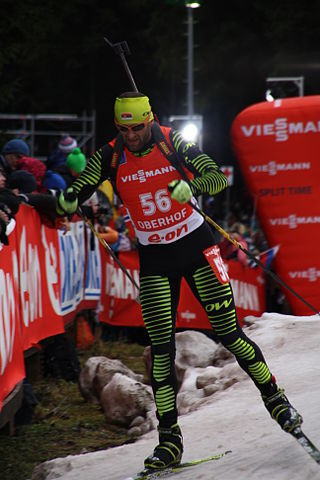
The biathlon is a winter sport that combines cross-country skiing and rifle shooting. It is treated as a race, with contestants skiing through a cross-country trail whose distance is divided into shooting rounds. The shooting rounds are not timed per se, but depending on the competition, missed shots result in extra distance or time being added to the contestant's total.

This article includes lists of all Olympic medalists since 1896, organized by each Olympic sport or discipline, and also by Olympiad.

The World Games are an international multi-sport event comprising sports and sporting disciplines that are not contested in the Olympic Games. They are usually held every four years, one year after a Summer Olympic Games, over the course of 11 days. The World Games are governed by the International World Games Association, under the patronage of the International Olympic Committee.

Ole Einar Bjørndalen is a retired Norwegian professional biathlete and coach, often referred to by the nickname, the "King of Biathlon". With 13 Winter Olympic Games medals, he is second on the list of multiple medalists behind Marit Bjørgen who has won 15 medals. He is also the most successful biathlete of all time at the Biathlon World Championships, having won 45 medals. With 95 World Cup wins, Bjørndalen is ranked first all-time for career victories on the Biathlon World Cup tour. He has won the Overall World Cup title six times, in 1997–98, in 2002–03, in 2004–05, in 2005–06, in 2007–08 and in 2008–09.
Biathlon at the 1992 Winter Olympics consisted of six biathlon events. They were held at Les Saisies, about 40 kilometres from the host city of Albertville. The events began on 11 February and ended on 20 February 1992. The 1992 Games were the first in which women competed in biathlon.

Duff Gibson is a Canadian skeleton racer who competed from 1999 to 2006. He was born in Vaughan, Ontario. His father was born on December 13, 1937. At the 2006 Winter Olympics in Turin, He won the gold medal in the men's skeleton, narrowly beating out his teammate Jeff Pain. With his victory, the 39-year-old Gibson surpassed ice hockey player Al MacInnis as the oldest gold medalist in Canadian Winter Olympic history. More significantly, Gibson became the oldest individual gold medallist in the history of the Winter Games, a record previously held by Norway's Magnar Solberg, who was 35 when he won the gold medal in the 20 km individual biathlon event at the 1972 Winter Olympics in Sapporo; he held the record until Ole Einar Bjørndalen won gold at the 10 km biathlon sprint aged 40 at the 2014 Sochi Olympics. He retired immediately following the 2006 Games in Turin.

Biathlon debuted at the 1960 Winter Olympics in Squaw Valley, California with the men's 20 km individual event. At the 1968 Winter Olympics in Grenoble, the men's 4 × 7.5 km relay debuted, followed by the 10 km sprint event at the 1980 Winter Olympics in Lake Placid, New York. Beginning at the 1992 Winter Olympics in Albertville, women's biathlon debuted with the 15 km individual, 3 × 7.5 km relay, and 7.5 km sprint. A pursuit race was included at the 2002 Winter Olympics in Salt Lake City. The top 60 finishers of the sprint race would qualify for the pursuit event. The sprint winner starts the race, followed by each successive biathlete at the same time interval they trailed the sprint winner in that event. At the 2006 Winter Olympics in Turin, a mass start was introduced where the top 30 biathletes from the previous four events were allowed to start together for the competition.

The International Biathlon Union is the international governing body of biathlon. Its headquarters were in Salzburg, Austria, until May 2020, when the Federation moved to Anif, on the outskirts of the city. It was rocked by a corruption scandal that broke in 2018, concerning the Russians bribing its top two officials. In 2022, due to the Russian invasion of Ukraine, Russia and Belarus, as invading nations, were suspended from all international biathlon competitions until further notice.
Tor Svendsberget is a former Norwegian biathlete.
Ivar Olaus Nordkild is a former Norwegian biathlete. He competed for Norway and won a gold medal in the 1965 Biathlon World Championships in Elverum in the team competition. He won a second gold medal in the men's relay in the 1966 world championships in Garmisch-Partenkirchen and a silver medal in the same event in 1971.
These are the results of the men's C-2 1000 metres competition in canoeing at the 1936 Summer Olympics. The C-2 event is raced by two-man sprint canoes and was held on Saturday, August 8, 1936.
Alexander Andreevich Ushakov is a former Soviet biathlete. In his career, he won three gold medals, one silver and one bronze medal at the Biathlon World Championships.

Milanko Petrović is a Serbian biathlete who participated at the 2010 Winter Olympics, becoming the first olympic biathlete for independent Serbia. At the 2014 Winter Olympics he carried Serbian flag at the opening ceremony and competed in biathlon and cross-country skiing. He represents Serbia at the Biathlon World Championships and he is a regular participant of the Biathlon World Cup and the first ever Serb to win World Cup points. Occasionally, he competes in cross-country skiing. At the 2013 Winter Universiade he made a remarkable success by winning first ever international medals for Serbia in biathlon and cross-country skiing.
The IAU 100 km World Championships have been held annually since 1987, at different locations, and is organized by the International Association of Ultrarunners (IAU). Due to lack of sponsorship, the 2013 event, planned for Jeju Island, South Korea, was cancelled and the 2014 event, originally due to be held at Daugavpils, Latvia, was held instead in Doha, Qatar.

The tank biathlon is a mechanized military sport event held by the Russian military as a part of the annual International Army Games. Inspired by the winter sport of biathlon, the sport emphasizes the complex training of tank crews including their rough terrain passing skills combined with the ability to provide accurate and rapid fire while performing maneuvers. The Russian team has so far demonstrated the most outstanding skills among participants.
The 6th Biathlon European Championships were held in Izhevsk, Russia, from February 1 to February 7, 1999.
The 4th Biathlon European Championships were held in Windischgarsten, Austria. Six competitions were held for athletes U26: sprint, individual and relays.
The 3rd Biathlon European Championships were held in Ridnaun, Italy. Six competitions were held for athletes U26: sprint, individual and relays.
The 2nd Biathlon European Championships were held in Le Grand-Bornand, France. Six competitions were held for athletes U26: sprint, individual and relays.
The 1st Biathlon European Championships were held in Kontiolahti, Finland. Six competitions were held for athletes U26: sprint, individual and relays.









